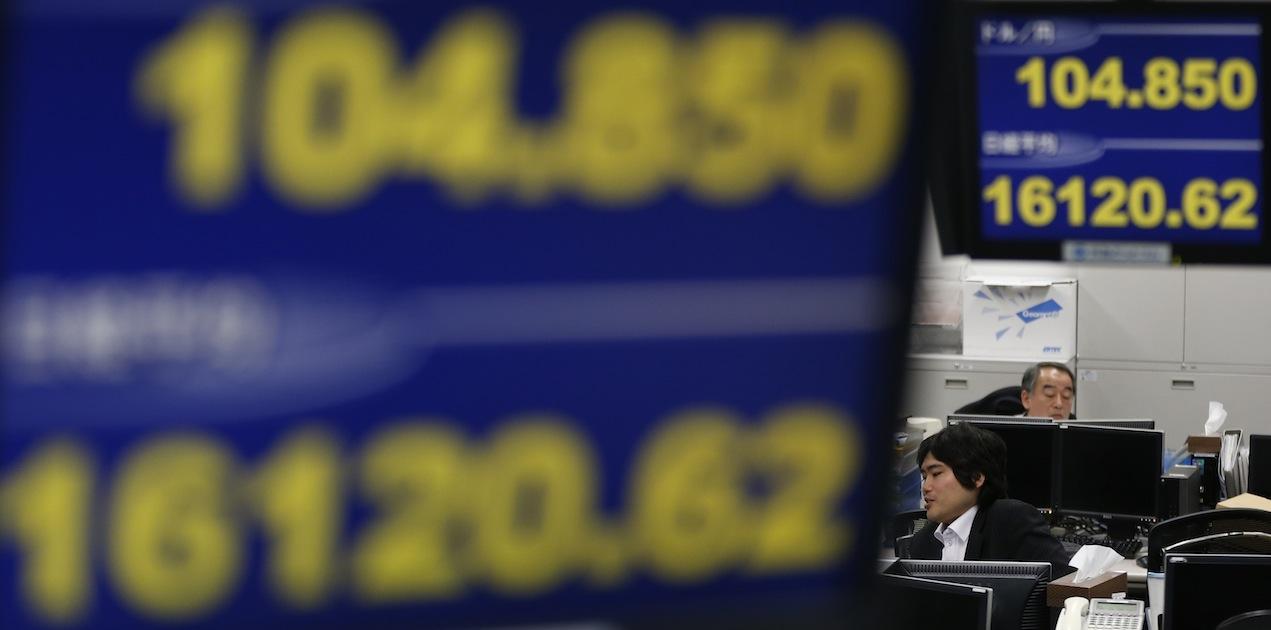Dollar on track for best year vs yen since 1979
Bareksa • 31 Dec 2013

Employees of a foreign exchange trading company work behind monitors displaying the Japanese yen's exchange rate against the U.S. dollar (top) and the Nikkei share average in Tokyo December 27, 2013 (Reuters/Toru Hanai)
Dollar/yen on track for biggest yearly pct gain in 34 years; Greenback gains nearly 21 pct vs yen in 2013
Reuters - The dollar hovered within sight of a five-year high versus the yen on Tuesday and was on track for its biggest yearly percentage gain versus the Japanese currency in 34 years, having risen nearly 21 percent in 2013.
The dollar last fetched about 104.93 yen, down 0.2 percent on the day and inching away from Monday's five-year high of 105.41 yen, the greenback's strongest level versus the yen since October 2008.
For the year, the dollar has risen 20.9 percent against the yen, putting it on track for its biggest one-year percentage gain versus the Japanese currency since 1979, when the dollar climbed 23.7 percent against the yen, according to Thomson Reuters data.
A divergence in the outlook for monetary policies in the United States and Japan has been a key to the dollar's stellar performance versus the yen this year, and that disparity could lead to further gains for the dollar, and losses for the yen, in 2014.
The yen has also retreated on the back of improving sentiment on the global economy and rising investor risk appetite.
A brighter outlook for the global economy can lead to an increase in overseas investment by Japanese investors and weigh on the yen, which has suffered broad losses this year and fallen to multi-year troughs versus a number of currencies.
"I think we could see the dollar push higher versus the yen on the back of dollar strength," said Satoshi Okagawa, senior global markets analyst for Sumitomo Mitsui Banking Corporation in Singapore, referring to the outlook for 2014.
Okagawa said he sees the dollar rising to 110 yen in the first half of next year.
The dollar could then dip to 95 yen in mid-2014, he said, adding that a Japanese sales tax hike in April could dent Japan's economy and Tokyo shares and trigger a rise in the yen, before re-testing the 110 yen threshold again in late 2014.
Crucial to the outlook will be whether the U.S. Federal Reserve can keep reducing its bond-buying stimulus over the course of 2014, he added.
Earlier in December, the U.S. Federal Reserve took its first step towards winding down its massive monetary stimulus, announcing that it would start reducing its monthly bond purchases in January.
By contrast, market participants expect the Bank of Japan to maintain, or even enhance, its ultra-easy monetary policy in 2014 to beat deflation.
In another sign of the yen's weakness this year, the euro has jumped a record 26.6 percent against the Japanese currency in 2013, the euro's biggest yearly rise versus the yen since the single currency was launched in 1999.
The euro last stood at 144.90 yen, down 0.1 percent from late U.S. trade, but still within the vicinity of a five-year high of 145.67 yen set last Friday.
The Swiss franc hovered near a 30-year peak against the Japanese currency and last fetched 118.27 yen. The Swiss franc had touched a high of 119.17 yen last Friday, its highest level against the yen since January 1983.
EURO'S STRENGTH
The euro was steady versus the dollar at about $1.3808 , not too far from a two-year high of $1.3894 set last Friday.
The euro has risen 4.7 percent against the dollar this year, putting it on track for its best yearly gain versus the greenback since 2007.
The euro's strength this year has baffled many commentators and investors, who had expected tough economic conditions in some member states to weigh on the single currency.
But the euro has been boosted as banks in the region repatriate funds ahead of the year-end to shore up their capital bases before an ECB Asset Quality Review and as banks repay cheap crisis loans to the ECB, which results in tighter liquidity.
In addition, ECB President Mario Draghi said in an interview with German news magazine Spiegel published on Saturday that he sees no urgent need to cut the euro zone's main interest rate further and sees no signs of deflation.